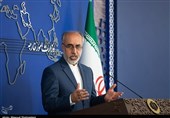UN Chief Warns of Fatal Heatwave Crisis, Calls for Global Action
TEHRAN (Tasnim) - UN Secretary-General António Guterres urged global action to combat worsening extreme heat, which is claiming lives, harming economies, and increasing inequalities.
People around the world are grappling with the deadly impacts of intensifying heatwaves, which are also damaging economies, widening inequalities, and undermining green development, UN Secretary-General António Guterres said on Thursday, according to ClimateChangeNews.
"Billions of people are facing an extreme heat epidemic – wilting under increasingly deadly heatwaves," Guterres stated, calling for global efforts to mitigate the devastating effects.
Extreme-heat events have become more frequent, intense, and longer-lasting in recent decades due to human-induced climate change.
Guterres' appeal follows a record-breaking week, with the world's hottest day record shattered twice, according to Europe’s Copernicus Climate Change Service. Monday exceeded Sunday, with the global average surface air temperature hitting 17.16 Celsius amid fierce heatwaves from the Mediterranean to Russia and Canada.
Preliminary data suggests Tuesday might have been the third consecutive hottest day, Guterres noted. He emphasized that heat, driven by "fossil fuel-charged, human-induced climate change," is estimated to kill nearly half a million people annually, about 30 times more than tropical cyclones.
This year, extreme heat has severely impacted vulnerable communities in the Sahel, killed over 1,300 pilgrims in Mecca during Hajj, and closed schools across Asia and Africa, affecting over 80 million children. "Extreme heat is the new abnormal," Guterres warned at the UN headquarters in New York.
In a coordinated push to address extreme heat, ten specialized UN agencies are joining forces. Guterres highlighted the need to protect the most vulnerable, including the poor, pregnant women, people with disabilities, the elderly, children, the sick, and the displaced. He called for increased access to low-carbon cooling, natural measures like tree planting, better urban design, and enhanced heat warning systems.
Guterres stressed the importance of protecting workers, citing a new International Labour Organization report indicating that over 70% of the global workforce—2.4 billion people—are at high risk of extreme heat, particularly in Asia-Pacific, Africa, and the Arab States. The UN is urging governments to review occupational safety laws to include provisions for extreme heat.
The UN also focuses on enhancing economies' and societies' resilience to heat through stronger infrastructure, resilient crops, and better health and water systems. "Countries, cities, and sectors need comprehensive, tailored Heat Action Plans, based on the best science and data," Guterres said.
He urged a swift phase-out of fossil fuels to limit global warming to 1.5C, as outlined in the 2015 Paris Agreement. Guterres criticized the surge in new oil and gas licenses by some of the world's wealthiest countries, which, according to the International Institute for Sustainable Development, have issued two-thirds of global oil and gas licenses since 2020.
Alan Dangour, director of climate and health at Wellcome, a UK-based science foundation, highlighted that the extreme heat impacts all parts of society, affecting health, food, water security, and infrastructure. He noted the potential for positive measures, such as using community facilities as cooling centers to address both heat stress and social isolation.
"There is still time for concerted action to save lives from the impacts of climate change, but we can no longer afford to delay," Dangour stated. Guterres emphasized that existing tools could significantly reduce the impact of extreme heat, saving lives and cutting costs.
He called for a "huge acceleration of all dimensions of climate action" as global warming outpaces current efforts, noting that the heat is now affecting both rich and poor nations. "The heat is being felt by those that have decision-making capacity – and that is my hope," he said.






